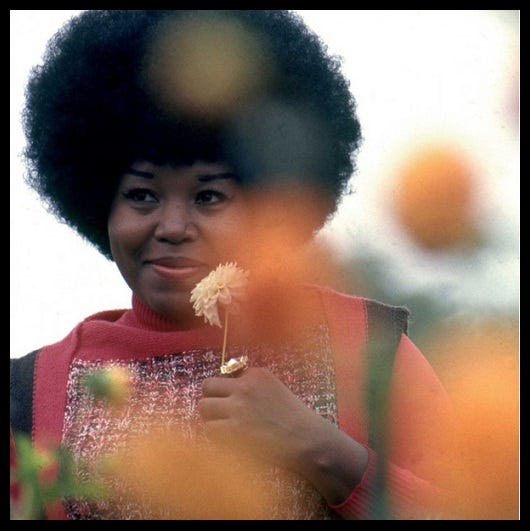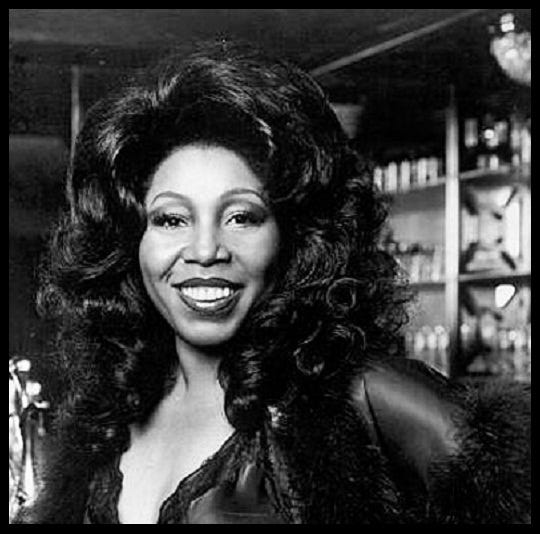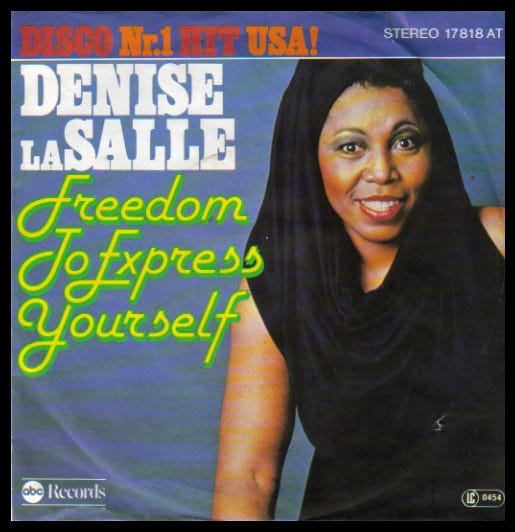Denise LaSalle (July 16, 1934 – January 8, 2018) - Freedom To Express Yourself (1976)
A dancefloor anthem about being yourself, featuring a backing band with Motown Funk Brothers Earl Van Dyke and Robert White, remixed by DJ legend François K.

Watch full video on Substack or Twitter.
Legendary singer/songwriter/producer Denise LaSalle released thirty albums over her nearly five decade-long career. Many of her songs were staples on R&B charts during the 1970s, and she also enjoyed success in the 80s and 90s when she recorded several critically acclaimed blues LPs for Malaco Records.
Ora Denise Allen was born in Mississippi during the Depression, where her parents were sharecroppers. She was the youngest of eight children and had to pick cotton and take various jobs from a young age to help support her family. Allen sang in local church choirs and by age 13 was a member of a gospel ensemble called the Sacred Five. In 1962, Allen moved to Chicago to live with her oldest brother.
In Chicago, while working as a barmaid on the fateful day President Kennedy was assassinated in Dallas, November 22, 1963, she met local producer Billy “The Kid” Emerson. He signed her to a one-year recording contract with Chess Records, but no songs were produced during this period. Emerson later started his own label, Tarpon Records, and in 1966 released her first single, credited to her stage name Denise LaSalle. The excellent upbeat jam “A Love Reputation” became a regional hit and later, a Northern Soul fave in the UK.
In 1968, Chess finally put out one of her singles. She wrote the A-side, “Count Down (And Fly Me To The Moon),” b/w “A Promise Is A Promise,” written by her arranger Eddie Silvers.
Both songs were produced by LaSalle and Bill Jones, who she married the following year in 1969. They set up an independent production company together, Crajon Records, and released her next single on that label in 1970. It was then picked up by Detroit’s Westbound Records. This time she wrote both sides, the scorching tale of love scorned “Heartbreaker of the Year” and on the flip, the upbeat Memphis soul-flavored “Hung Up, Strung Out,” which was arranged by Willie Mitchell and recorded at his Royal Sound Studio.
In 1971, Westbound released LaSalle’s biggest hit, “Trapped by a Thing Called Love,” which she wrote and was again arranged by Willie Mitchell and recorded in Memphis. The single went to #1 R&B and reached #13 on the pop charts, and that November was awarded a gold record for one million copies sold.
It became the title track to her debut album Trapped by a Thing Called Love, which was released on Westbound the following year in 1972. That album also featured her follow-up single, the very funky jam “Now Run And Tell That,” which she wrote and produced and Mitchell arranged and recorded. The song’s title came from the sign-off regularly used by news director Roy Wood at Chicago’s Black-owned radio station WVON. It was a #3 R&B hit but only made it to #46 pop.
LaSalle and Jones divorced in 1974. Two years later she married James E. "Super Wolfe" Wolfe Jr., a local DJ. They moved from Chicago to Jackson, Tennessee, and she signed a deal with ABC Records. That same year in 1976, she recorded and released Second Breath, her first album on ABC.
As usual, LaSalle wrote nearly all the songs on this album, including its superb opening cut, the dancefloor liberation anthem “Freedom To Express Yourself.” Released as a single in April, 1976, it reached #17 on the dance charts, although it just barely made the R&B charts at #100.
The record’s producers were credited as Ordena Enterprises, Inc. and Soultastic, Inc., which were aliases for Lasalle herself (“Ordena” was an abbreviation of her real name, Ora Denise Allen) and Rick Taylor, her co-producer on Second Breath. Taylor co-wrote one song on the album with her, “Sit Down And Hurt Awhile.”
“Freedom To Express Yourself” and the rest of Second Breath had a stellar lineup of musicians. Earl Van Dyke was on piano, the longtime bandleader of the Funk Brothers. Robert White played rhythm guitar, the Funk Brother legend responsible for the opening riff on The Temptations’ “My Girl.” The legendary Nashville session player Bob Babbitt was on lead guitar, and Rod Chandler of McKinley Jackson’s band The Politicians played bass. Horns came courtesy of the Detroit Horns.
In 1979, legendary disco DJ François Kevorkian put out a rare remix of “Freedom To Express Yourself” on the Sunshine Sound acetate label owned by Frank Trimarco in New York City. Acetates on this label were pressed in very limited quantities and sold at select record stores favored by DJ’s in NYC and Los Angeles. François K’s remix took what was already a stellar track and polished it into a dancefloor masterpiece.
#soul #disco #FrancoisK #DeniseLaSalle






